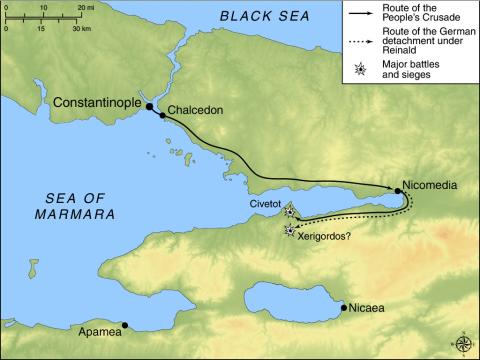The People's Crusade
[1.2.5] Audientēs dēnique Turcī quod Petrus Heremīta et Guvalterius Sinehabere fuissent in Cyvītō, quae suprā Nicēnam urbem est, vēnērunt illūc cum magnō gaudiō ut occīderent illōs et eōs quī cum ipsīs erant. Cumque vēnissent, obviāvērunt Guvaltēriō cum suīs, quōs Turcī mox occīdērunt. Petrus vērō Heremīta paulō ante ierat Cōnstantīnopolim, eō quod nequībat refrēnāre illam dīversam gentem, quae nec illum nec verba eius audīre volēbat. Irruentēs vērō Turcī super eōs occīdērunt multōs ex eīs; aliōs invēnērunt dormientēs, aliōs nūdōs, quōs omnēs necāvērunt, cum quibus quendam sacerdōtem invēnērunt missam celebrantem, quem statim super altāre martyrizāvērunt.
notes
(October 1096) The Turks advance on the crusaders holding Kivotos (Helenopolis), on the Sea of Marmara, and kill many of them.
quod: introduces an indirect statement (with indic. or subj.); this is CL (OLD 5) but particularly common in ML.
Guvalterius Sinehabere: Walter Sans-Avoir (“Walter the Penniless”). He was lord of Boissy-sans-Avoir, near Paris, and not in fact penniless, but the “sans-avoir” part of Boissy-sans-Avoir was taken as a nickname, or was misunderstood.
fuissent: CL would use an imperfect subjunctive.
Cyvītō: Kivotos/Cibotos/Civetot, a fort near Helenopolis, on the Sea of Marmara (called in antiquity the Propontis). Remains of the fort have recently been found in the water of Hersek Lagoon.
eō quod nequībat refrēnāre illam dīversam gentem: eō quod (ML) = quod (CL); eō quod is CL, but emphatic. In fact Peter probably went to plead for supplies and reinforcements.
nec illum nec verba eius audīre: to “obey him or listen to what he said” (Hill).
super eōs: CL would be in eōs.
nūdōs: "unarmed."
vocabulary
diversus –a –um: here perhaps “differing in identity, distinct” (OLD 5e), or perhaps “holding divergent views” (OLD 5d).
missa missae, f.: mass (ML).
altāre altāris, n.: “altar” (in CL usually in plural)

